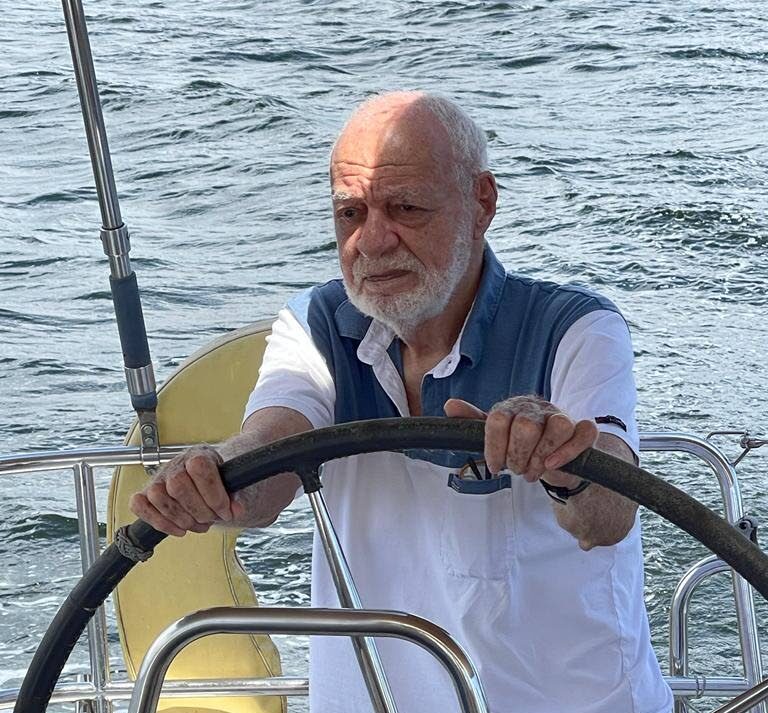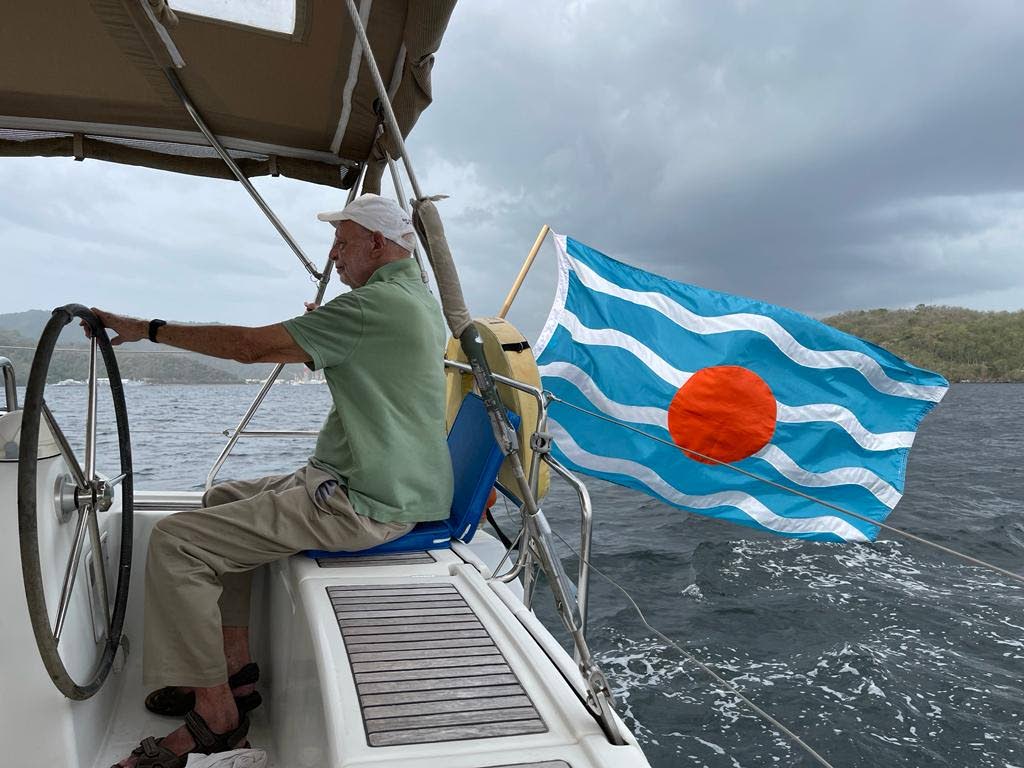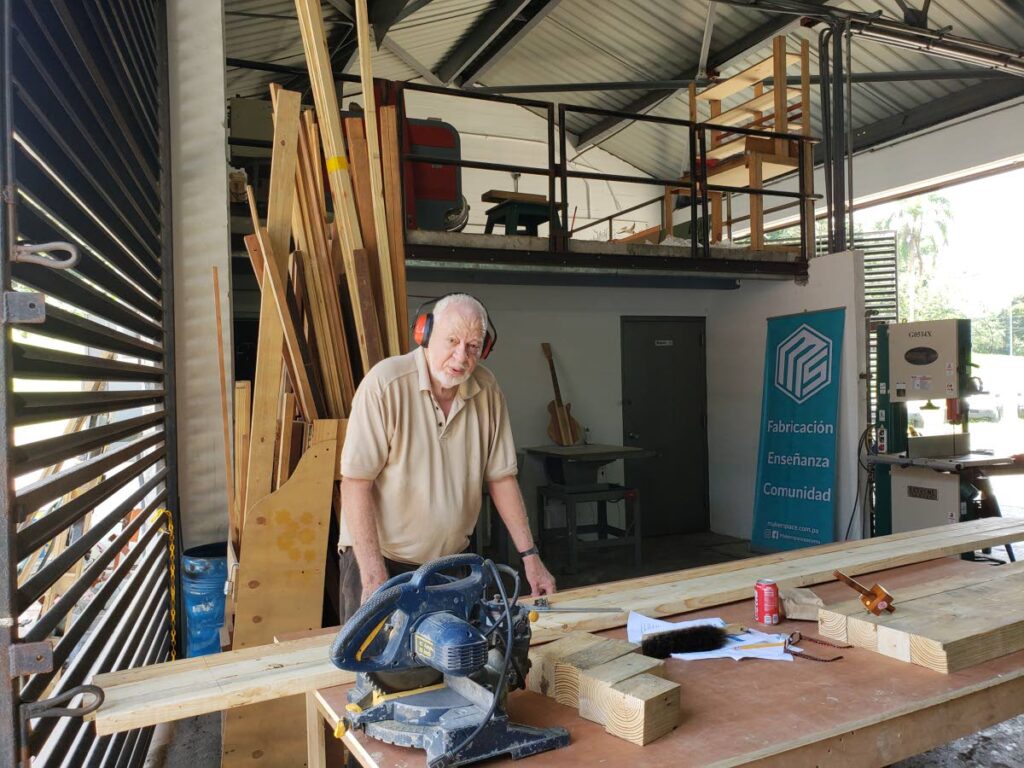Family, friends pay tribute: Denis Solomon, larger than life

He may have been eccentric, gruff and straightforward to a fault, but linguist Dr Denis Solomon was also caring, generous and a doting grandfather.
Described by many as the most intelligent man they ever met, Solomon died at 88 on August 27 at his home in St Ann’s.
His daughters Elizabeth and Juliet Solomon told Sunday Newsday he “passed away of fed-up-ness,” as he resented his loss of mobility and independence through age and illness. Elizabeth is married to Attorney General Reginald Armour SC.
Solomon was a retired senior lecturer in linguistics and French at UWI, a translator and conference interpreter, co-founder of the TT Humanist Association, a former diplomat, and a columnist and editorial writer.
At Queen's Royal College he won an island scholarship to Cambridge University. There he earned a degree in modern and medieval languages in 1957, then worked at the BBC World Service.
He also went to Columbia University in New York, graduating with an MA in 1966 and an MPhil in 1974, and in 1990 earned a PhD in linguistics from UWI.
Elizabeth and Juliet said as a sea scout he used to go to Chacachacare to perform Shakespeare plays at the leper colony, and was part of the TT Sailing Association from its inception. He instilled that love of sailing and the sea in his children, as Elizabeth still sails, Juliet fishes and Paul is a marine pilot.
He was also a member of the Selwyn College hockey team at Cambridge.
Elizabeth said, “He was very into sports. He cycled a lot, he was a competitive swimmer, and a sailor his whole life. He also built, refurbished and sailed boats.”
Solomon was also heavily involved in politics. He was a senator with the Tapia House Movement, a political party that started as the Tapia House Group, formed by his former QRC classmate Lloyd Best in 1968. He was involved in the Federation Movement, representing TT internationally when it first became independent.
It was while they both worked for the Federal Civil Service that Solomon met his first wife, the late social activist Sheilah Solomon, from Jamaica. When Jamaica pulled out of the federation and it fell apart, the couple got married. Although they made their base in TT, as a diplomat he was posted to New York and as deputy high commissioner to Venezuela.
Solomon’s father, Patrick Solomon, was TT’s first Minister of Home Affairs, and his younger brother was attorney Frank Solomon SC.
“I think it’s safe to say that, through his father and then his own involvement, he was a significant person in the early years in the development of TT as an independent country and into becoming a republic,” said Elizabeth.
The sisters said he was an activist in the Black Power Movement and, years later, was arrested over anti-apartheid marches. They recalled a time there was an identification card that indicated a person’s race. But he refused to state his race in ethnic terms, instead writing “human.”
After he left the Foreign Service he, his wife and their daughters returned to TT in 1969, one year before Paul was born.
Solomon became a lecturer at UWI in language and linguistics, and decided they would live on Gasparee Island. They recalled no one else lived there at the time and they lived in an old whaling station he bought and refurbished himself.
“He formed us into a little club and we had our own constitution. He certainly ensured we were not mundane,” said Elizabeth.
At some point they lived between the UWI St Augustine Campus and Gasparee, as the children attended the University School in St Augustine.
Juliet recalled, “He used to drop us to school, all three of us, on a bicycle, a racing bicycle. Elizabeth sat on the crossbar; I would sit on the little metal piece behind him. Paul had to stand up and I would have to hold on to Paul’s legs. And the whole school used to gather to see this circus every morning and every evening.”
Over the years, Solomon also wrote columns for the Express, Independent, and Tapia’s Review. He enjoyed writing theatre reviews and was a close friend of the late Nobel prize winner Sir Derek Walcott.

His second wife was an Italian, Ilda Maundy, and, when he retired in 1994, he moved to Italy with her, with no intention of returning to TT.
Elizabeth said, “He was deeply committed to the creation of this new independent country. I think he felt a deep sense of disappointment and…the mediocrity is what really pained him. He did not enjoy being here, for what he felt was the failure of many institutions to live up to the potential that they had, for many reasons.”
Juliet added, “He felt that a lot of the potential that came out of Independence was squandered.”
When his wife died, Solomon went to live with Juliet in Peru and then Panama. Juliet said when he lived with them, her two children would jokingly hum the Imperial March from Star Wars as he entered or left a room.
“He was difficult as a father and a grandfather, there’s no denying that, but he had a wonderful sense of humour, and he loved babies and his (six) grandchildren. He had a special relationship with each one of them.”
Elizabeth added that he didn’t suffer fools gladly, but appreciated and contributed to any intelligent humour.
He was also a dedicated woodworker, and wherever he lived, he had a workshop where he made furniture, clocks, jewellery boxes and more. He continued the practice when he returned to TT around 2021 and settled in St Ann’s.
Solomon will be cremated on September 7, when there will be a private ceremony for family and friends and a “good Irish wake,” as his mother was Irish. As requested in his will, his funeral will involve no church or any religious symbolism.
Juliet recalled, “When we were going to school for the first time, he said to the three of us, ‘You will be asked what religion you are. You will reply, ‘I am a practising atheist.’”
THE SMARTEST MAN
Eric Maitrejean, translator, French lecturer and head of the Department of Modern Languages and Linguistics at UWI, described Solomon as “larger than life.”
They met in 1988 when Maitrejean came to TT from France. Solomon, his contact in the Foreign Service, welcomed him into the Department of Language and Linguistics.
“I found the person very interesting – a bit gruff, but at the same time extremely competent and gifted. He saw something in me that I didn’t see. He really believed in me from early on.”
Maitrejean returned to France in 1990, but Solomon called him in 1992 about a position at UWI which Solomon wanted him to take. They worked together until Solomon retired in 1994, and stayed in touch.
He said while Solomon was not polite, he did not waste time, was a “doer,” very generous and attentive and a father figure to many, who thought he would always be around.

He recalled Solomon would call him on the phone and would not say hello, but simply say or ask what he called for, then hang up when he got his answer or said his part.
“In 1993 he did something which was a bit off-putting. He told me, ‘Okay. Now you have to do the training for the interpreting programme.’
“And I said, ‘No no. That’s not for me.’
“He said ‘It’s too late. I signed you up. You have to pay now.’
“So he pushed me into the training and then the profession.
“He was really a character.”
Maitrejean said Solomon’s book, The Speech of Trinidad: A Reference Grammar (1993) said TT English was not “broken” English, as it had its own structure and rules. It stressed that language was a tool, with no one better than the other.
“His book is still used today by linguists, because it’s really a seminal piece of work.
“Also, he wrote for three local papers, and his columns were widely commented on in society for weeks after they were written. The tones of the articles were very erudite, but very funny and highly provocative.”
Maitrejean said over the years they would talk about a wide variety of topics, including sports, world affairs, languages and literature. Whatever the topic, those talks were always intellectually challenging.
Former head of the Public Service Reginald Dumas said he and Solomon had been friends since they met when they entered QRC together in 1946.
He said Solomon was fluent in English, French, Spanish, Italian and “could get by” in Russian.
“Denis was one of the brightest people I have ever met, in terms of the quality of his mind, and I’ve met a lot of people in different parts of the world in my fairly long life so far.
“I know why people say he was contrary. He was not the easiest person in the world. His language was often not what one might consider diplomatic and he offended a lot of people.”
He believed they got along because Solomon did not consider him an “intellectual slouch,” so although they did not always agree, they respected each other.
Dumas said he was “taken aback” by Solomon’s death and would miss their discussions.
Newsday columnist BC Pires too described Solomon as one of the brightest people he had ever met. He also said Solomon was larger than life, in his physical appearance, personality and intelligence.
“He had a genuine wit. On top of that, he had a perspective on things that is rare in TT.
“He was a principled guy. He said to me that it’s exactly when it’s difficult to do the right thing that it’s your greatest duty to do it.”
Pires said despite all his hobbies and busyness, Solomon would take the time to explain things to him, and was “a true teacher” who did not judge the student.
However, he admitted Solomon was famously impatient and eccentric. Pires recalled his friend Dave was Solomon’s neighbour in Santa Margarita, St Augustine, about 40 years ago and Solomon had a “war” with Dave’s dogs.
He said Solomon would be wearing roller skates in his front porch, playing opera music loudly, and throwing stones, which he had collected and placed in a pile on the porch, at the dogs.
As Dave passed, Solomon would stop stoning the animals to say hi and ask how he was doing, then resume stoning the dogs after Dave passed. To Solomon, the war was between him and the dogs. Dave was a non-combatant.
Writer and editor Kevin Baldeosingh added to the consensus, saying Solomon was the smartest Trinidadian he ever knew. He added that Solomon was not mean or spiteful: if he was disagreeable, there was good reason for it.
He recalled when Solomon went to live in Italy, he gave away his books. Baldeosingh was astonished by the number of books on almost every subject except economics.
They met when they both wrote for the Express, and later co-founded the TT Humanist Association with a few others.
“Denis came on board because he was very anti-religion, wanting to get religion out of public policy and so on.”
Baldeosingh said the main goals of the organisation were to criticise religious beliefs when they intruded on public policy. They believed public policy should be based on research and data, and people should apply reason and logic to any topic.
“He was a man who wasn’t afraid to offend anyone or the powers that be. He called it as he saw it.
“And it wasn’t just opinion. He was very analytical and, in terms of how he wrote, he was very clear ¬ and, of course, grammatical.”

Comments
"Family, friends pay tribute: Denis Solomon, larger than life"